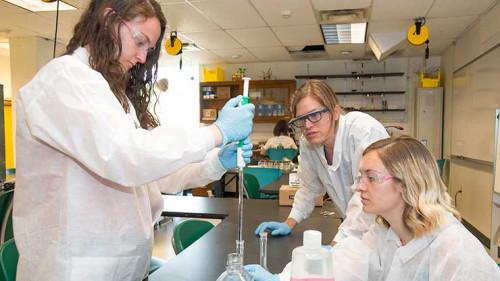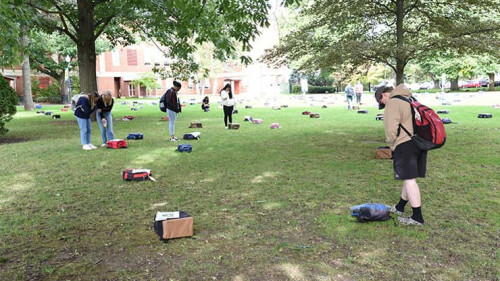
By Mara Afzali '14
Siena College hosted a unique gathering of philosophers, art historians, graduate students and academics from a variety of other disciplines earlier this month for the inaugural meeting of the Kristeva Circle. Participants traveled across the globe, from as far away as Shanghai, Paris and London, and as close as Albany, to attend the conference.
The Kristeva Circle was created by Assistant Professor of Philosophy Fanny Söderbäck, Ph.D. along with colleagues from Drexel and Vanderbilt Universities. Its mission is to support research on, or influenced by, the philosopher, psychoanalyst and novelist Julia Kristeva. She has made monumental achievements as an extraordinary international thinker of our time and an inspiration for social change.
Participants attended a series of panels comprised of three presentations grouped together by similar topics. The presenters in each panel shared their specific research on Kristeva’s works and followed up with time for questions from the audience. The structure allowed for a “conversation” to occur between projects, revealing interesting crossovers between different areas of research. The first panel opened with a welcome letter written by Kristeva who was honored by the conference and professed the hope that she would be able to attend the next one.
For many participants, the two day conference was an opportunity worth the travel, as they have found it a challenge to receive the depth of feedback at their own institutions, where not everyone is familiar with Kristeva’s theories. At the conference, it was just the opposite. The room was filled with people who dedicated years of study to Kristeva’s theories and many of whom authored books on her works, which cover topics as wide ranging as aesthetics in art, social and political revolts, human vulnerability, Freudian psychoanalysis and the maternal/feminine.
Each day there was also a keynote address. Noëlle McAfee, an associate professor of philosophy at Emory University, delivered the first address titled, “The Interiorization of Mortality: The Unconscious and Kristeva’s Death Drive.” The second keynote address was given by Maria Margaroni from the University of Cyprus. She spoke on “Julia Kristeva’s Voyage in ‘the Theresian Continent’: The Malady of Love and the Enigma of an Incanated, Sharable, Smiling Imaginary.” Both of these scholars have written extensively on Kristeva and published books and articles in notable philosophical journals.
A round table discussion offered yet another distinctive experience. Participants had the opportunity to delve into Kristeva’s most recently published work, The Severed Head, which is a book based on an exhibit at the Louvre museum in Paris for which Kristeva served as curator. It covers several topics related to the appearance of severed heads in art, literature and revolutionary politics. The panelists each presented on one of the 10 chapters of the book, which, as participant Grace Hunt from Bard College explained, “managed to give a great introduction for those unfamiliar with the work while simultaneously providing a critical response, which spoke to those more accustomed to it.”
Many of the attendees were Siena College professors who took full advantage of this opportunity by attending speeches, presenting in panels or chairing sessions.
Athena Colman from Brock University in Canada enjoyed her time at the Kristeva Circle. “The event has been just brilliant! Brilliantly hosted, on a beautiful campus, with a brilliant group of people gathered. I can’t wait for the next meeting,” Colman said.
The conference was organized by Professor Söderbäck with support from Philosophy Department, Office of Academic Affairs, Academic Programs, School of Liberal Arts, Women’s Studies Minor, Sr. Thea Bowman Center for Women, Siena College Fair Trade Initiative and Kelly Oliver and Vanderbilt University.




